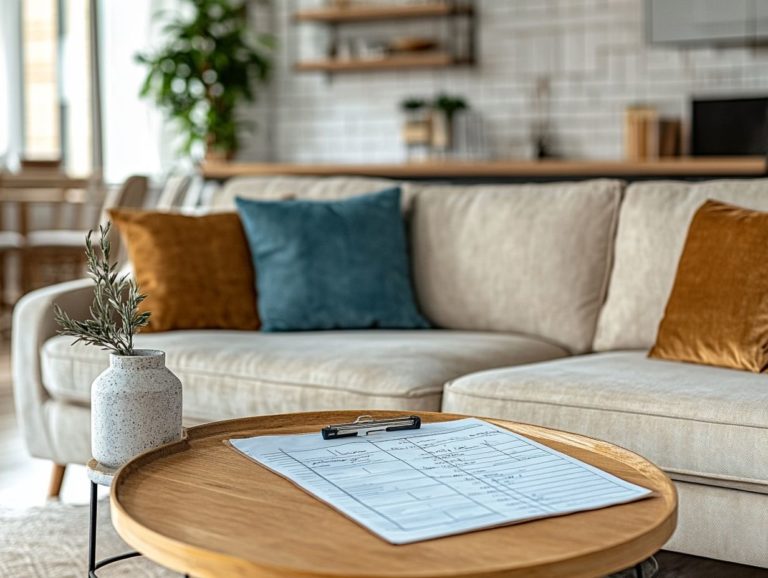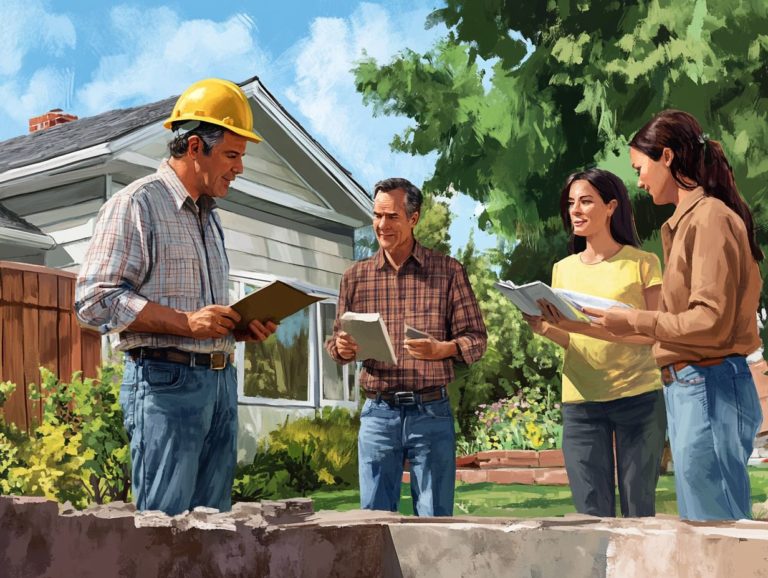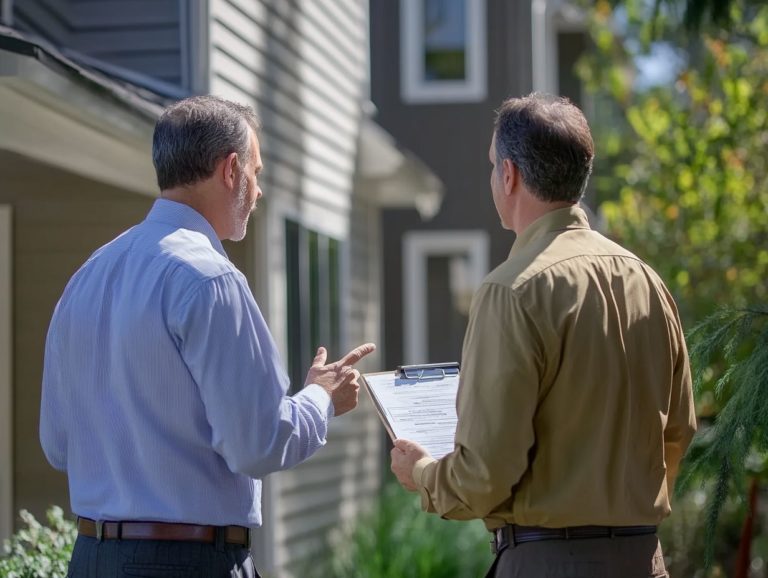Common Misconceptions About Home Inspections
Buying or selling a home is a significant milestone. Grasping the intricacies of the process is essential for your success.
One crucial element to consider is the home inspection. This thorough evaluation can uncover hidden issues and provide you with much-needed peace of mind.
In this article, you’ll explore what a home inspection entails, why it matters for both buyers and sellers, and the common misconceptions that can cloud your judgment.
Join us now to unlock the secrets of home inspections! You’ll be guided through what to expect during an inspection, how to prepare effectively, and tips for selecting the right inspector.
Contents
- Key Takeaways:
- What is a Home Inspection?
- Why Home Inspections are Important
- Common Misconceptions About Home Inspections
- What to Expect During a Home Inspection
- How to Prepare for a Home Inspection
- Choosing the Right Home Inspector
- Frequently Asked Questions
- What are some common misconceptions about home inspections?
- Do home inspections only focus on the structure of a house?
- Do newly built homes require a home inspection?
- Is a home appraisal the same as a home inspection?
- Can a home inspection fail a house?
- Can a home inspection be skipped if the buyer plans to renovate?
Key Takeaways:

- Home inspections are essential for both buyers and sellers.
- Many misconceptions exist about home inspections, such as the belief that they are only necessary for older homes.
- Selecting a qualified inspector is key to a successful inspection.
What is a Home Inspection?
A home inspection is a thorough visual assessment of a residential property. It is typically carried out by a qualified inspector, someone with the right training and experience.
This inspection evaluates the overall condition of the home and identifies any deficiencies in critical systems like plumbing, electrical, and structural components.
This objective overview presents an invaluable educational opportunity as a home buyer. It enables you to make informed decisions throughout your home buying journey, whether you re stepping into homeownership for the first time or navigating the market as a seasoned buyer.
Defining the Purpose and Process
The purpose of a home inspection is to offer you an objective overview of a property’s condition. This includes both its mechanical aspects and visible components to uncover any potential issues that could impact your decision as a home buyer.
This comprehensive evaluation explores various facets of the home, including roofing, plumbing, electrical systems, and foundational integrity.
Inspectors meticulously assess each element and compile a detailed inspection report highlighting any issues identified during the examination. This report not only educates you about the current state of the property but also serves as a crucial tool for understanding future financial obligations related to repairs or renovations.
Armed with this valuable information, you can make informed decisions, negotiate necessary repairs, or adjust your budget to accommodate essential fixes. Ultimately, this ensures that you re fully prepared for the journey of homeownership.
Why Home Inspections are Important
Home inspections are crucial in your home buying journey. They offer you vital insights into the condition of the property you’re considering.
This step ensures that you’re fully informed before making such a significant investment.
It’s important to recognize that an inspection can uncover safety concerns and existing deficiencies that could influence both the home appraisal and its overall market value.
Benefits for Buyers and Sellers
For buyers, home inspections provide invaluable insights into a property’s condition. This enables you to negotiate essential repairs or reevaluate your purchase offers based on the findings of a trusted inspector.
Understanding these insights instills confidence as you navigate this significant investment.
Sellers also reap the rewards of the inspection process, which underscores transparency and helps mitigate potential disputes later on. By addressing issues upfront, sellers can make necessary repairs, boosting the property s appeal and potentially speeding up the sale.
In the end, home inspections pave the way for smoother transactions, allowing both parties to move forward with peace of mind, knowing they ve addressed the critical elements of the deal.
Ready to take the next step? Contact a professional for your home inspection needs today!
Common Misconceptions About Home Inspections

You may encounter several myths surrounding home inspections. These home inspection myths debunked can create misunderstandings about their purpose and significance in the home buying process.
A prevalent misconception is that a home inspection is a pass or fail test. In reality, it is an unbiased evaluation designed to provide detailed insights into the property’s condition, as explained in understanding the basics of home inspections.
Debunking Myths and Misunderstandings
Many believe that home inspections are unnecessary for new construction homes. However, you should still engage a professional home inspector to thoroughly evaluate the mechanical systems and structural integrity of the property.
Some assume that a newly built house complies with all safety and quality standards, but that isn t always true. Construction errors can happen, and critical components like electrical systems, plumbing, and insulation may not have been installed correctly.
Home inspections act as a crucial safeguard. They allow you to identify potential issues before they escalate into costly repairs. While an inspection can uncover existing problems, it cannot foresee future ones, which can lead to misunderstandings about safety. For more insights, read about understanding the necessity of home inspections.
Hiring a home inspector gives you peace of mind, ensuring that your investment in a new home is well protected.
What to Expect During a Home Inspection
During a home inspection, you can anticipate a careful check of the property. This involves a visual assessment of key systems, structural components, and potential safety issues, ending with a clear report on the property’s condition for you.
By understanding what to expect, you’ll be better equipped to prepare for scheduling inspections and actively engaging in the process.
Step-by-Step Guide
The home inspection process starts with a professional home inspector performing a visual examination of the property. This is followed by a thorough review of major systems like electrical, plumbing, and HVAC.
The inspector first assesses the structural integrity, keeping an eye out for problems like cracks in the foundation or roof leaks. Next, they examine the plumbing system, checking for leaks, evaluating water pressure, and ensuring proper drainage.
The electrical inspection focuses on the safety of wiring and circuits, making sure everything complies with current codes. HVAC (heating, ventilation, and air conditioning) systems will be checked for efficiency and functionality, along with any signs of wear. Each of these steps is vital, creating a comprehensive picture of the property s condition.
The resulting inspection report becomes an essential tool, informing both buyers and sellers about necessary repairs and potential future expenses. This report ultimately guides negotiations.
How to Prepare for a Home Inspection
Getting ready for a home inspection can make all the difference for both buyers and sellers. It lays the groundwork for a seamless experience.
As a seller, focus on addressing any necessary maintenance tasks. Create an inviting atmosphere that showcases the property’s best features.
As a buyer, create a thorough checklist of questions and expectations ahead of the inspection day. This proactive approach will help you navigate the process with confidence and clarity.
Tips for Sellers and Buyers

Consider conducting a pre-inspection to tackle any potential issues before the official home inspection. As a buyer, it s essential to hire reputable inspectors who can provide an unbiased evaluation of the property.
Taking these proactive steps can help uncover hidden defects, allowing you to make necessary repairs or adjustments to your listing price. This transparency builds trust quickly and helps sell faster.
Selecting experienced inspectors provides valuable insights into the true condition of a home. Additionally, knowing how to avoid home inspection pitfalls and encouraging open communication among all parties can enhance the inspection experience, ensuring that everyone is aligned regarding findings and expectations.
A thorough understanding of the inspection results enables both sellers and buyers to make informed decisions, ultimately leading to a smoother transaction.
Choosing the Right Home Inspector
Finding the right home inspector is vital. It ensures a thorough inspection and an accurate report on your property’s condition.
As a buyer or seller, prioritize finding a qualified inspector linked to a trusted professional group, like the American Society of Home Inspectors (ASHI). This affiliation guarantees an expert opinion you can trust.
Factors to Consider and Questions to Ask
When selecting a home inspector, consider several key factors to ensure a comprehensive evaluation of your potential property. Look into the inspector’s experience, qualifications, and adherence to professional standards. Attention to detail leads to better findings.
Pricing matters. Request detailed quotes to know what’s included in the inspection. Don t miss out on availability! A timely inspection gives you a competitive edge. It might also be beneficial to ask about additional services they offer, like thermal imaging or radon testing, which checks for a colorless, odorless gas that can be harmful at high levels.
Consider asking these sample questions:
- How many inspections have you completed in the past year?
- Are you a member of any professional organizations?
These inquiries provide valuable insights into the inspector’s expertise and how well they align with your needs.
Frequently Asked Questions
What are some common misconceptions about home inspections?
Some common misconceptions include: they are only necessary for old homes, they are too expensive, and they are only for buyers, not sellers. Understanding how to avoid common home inspection errors can help clarify these points.
Do home inspections only focus on the structure of a house?

No, home inspections cover much more than just the physical structure. They include inspections of electrical, plumbing, heating, and cooling systems, as well as the roof and foundation.
Do newly built homes require a home inspection?
Yes, newly built homes can have just as many issues as older homes. It’s important to have a home inspection to catch potential problems before they become major and costly.
Is a home appraisal the same as a home inspection?
No, they are different. An appraisal determines value, while an inspection checks for problems.
Can a home inspection fail a house?
No, a home inspection does not provide a pass or fail grade. It simply provides a detailed report of the home’s condition, helping buyers and sellers make informed decisions.
Can a home inspection be skipped if the buyer plans to renovate?
No, a home inspection is still necessary before renovations. It can uncover underlying issues that need to be addressed, saving the buyer time and money in the long run.






